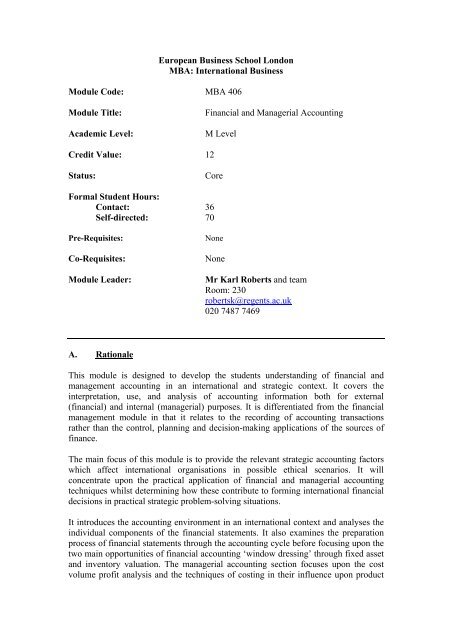MBA 406 Module Title - The European Business School London
MBA 406 Module Title - The European Business School London
MBA 406 Module Title - The European Business School London
Create successful ePaper yourself
Turn your PDF publications into a flip-book with our unique Google optimized e-Paper software.
<strong>European</strong> <strong>Business</strong> <strong>School</strong> <strong>London</strong><br />
<strong>MBA</strong>: International <strong>Business</strong><br />
<strong>Module</strong> Code: <strong>MBA</strong> <strong>406</strong><br />
<strong>Module</strong> <strong>Title</strong>: Financial and Managerial Accounting<br />
Academic Level: M Level<br />
Credit Value: 12<br />
Status: Core<br />
Formal Student Hours:<br />
Contact: 36<br />
Self-directed: 70<br />
Pre-Requisites: None<br />
Co-Requisites: None<br />
<strong>Module</strong> Leader: Mr Karl Roberts and team<br />
Room: 230<br />
robertsk@regents.ac.uk<br />
020 7487 7469<br />
A. Rationale<br />
This module is designed to develop the students understanding of financial and<br />
management accounting in an international and strategic context. It covers the<br />
interpretation, use, and analysis of accounting information both for external<br />
(financial) and internal (managerial) purposes. It is differentiated from the financial<br />
management module in that it relates to the recording of accounting transactions<br />
rather than the control, planning and decision-making applications of the sources of<br />
finance.<br />
<strong>The</strong> main focus of this module is to provide the relevant strategic accounting factors<br />
which affect international organisations in possible ethical scenarios. It will<br />
concentrate upon the practical application of financial and managerial accounting<br />
techniques whilst determining how these contribute to forming international financial<br />
decisions in practical strategic problem-solving situations.<br />
It introduces the accounting environment in an international context and analyses the<br />
individual components of the financial statements. It also examines the preparation<br />
process of financial statements through the accounting cycle before focusing upon the<br />
two main opportunities of financial accounting ‘window dressing’ through fixed asset<br />
and inventory valuation. <strong>The</strong> managerial accounting section focuses upon the cost<br />
volume profit analysis and the techniques of costing in their influence upon product
pricing and decision making. <strong>The</strong> module will then examine the impact of short-term<br />
operational and long-term capital budgeting and their deviational investigation and<br />
decision-making through variance analysis.<br />
B. Aims<br />
To discuss the concepts, frameworks, debates and issues surrounding Financial and<br />
Managerial Accounting in both a domestic, <strong>European</strong> and international, strategic<br />
context.<br />
<strong>The</strong> main aims of this module are to appreciate:<br />
• the international financial accounting environment, recent international<br />
developmental issues and their impact upon international financial reporting from<br />
a strategic and ethical perspective;<br />
• the main issues of ‘window dressing’ and their interpretation through financial<br />
ratio analysis and interpretation;<br />
• the cost volume profit analysis and its relationship with costing and pricing<br />
decision-making;<br />
• the operational and capital budgetary process in an international context and its<br />
advisory role through the process of variance analysis;<br />
• the importance of current global accounting research to international<br />
organisations;<br />
• the best international accounting practice both at the functional, planning and<br />
strategic stages;<br />
• the wider developmental strategic and ethical international issues concerned with<br />
financial and managerial accounting.<br />
<strong>The</strong> foundation of this module is the critical understanding and appraisal of current<br />
research in the field of strategic, international and ethical practices within financial<br />
and managerial accounting.<br />
C. Learning Outcomes<br />
Upon completion of the module, students should have knowledge and skills that<br />
connect to the overall learning outcomes of the programme, as indicated in the table<br />
overleaf:
<strong>Module</strong> Learning Outcomes (MLOs)<br />
Attain the knowledge and understanding of the management of<br />
the sources, control and application of finance and its recording<br />
through the accounting and economic process<br />
Appreciate the dynamic aspects of accountancy within a changing<br />
international and global environment<br />
Prepare for international assignments based on accurate selfknowledge<br />
and anticipation of areas of difficulty.<br />
Demonstrate a high degree of self-awareness and sensitivity to<br />
others in an international context.<br />
Exhibit the application of analytical and creative skills in<br />
evaluating accounting information and generating alternative<br />
solutions.<br />
Identify the importance of self-directed learning and continuous<br />
personal development in financial and management accountancy.<br />
D. Teaching/Learning Strategy<br />
Programme<br />
Learning Outcomes<br />
(PLOs)<br />
<strong>The</strong> teaching/learning strategy for this module has been designed to ensure that the<br />
programme level learning outcomes outlined above have been acquired. <strong>The</strong> teaching<br />
activities will consist of two hours of lectures as well as seminars. This module unit<br />
will be taught in a twelve week semester divided into lectures, seminars and student<br />
led seminars.<br />
<strong>The</strong> main strategy in lecturing will be to introduce the knowledge base and<br />
demonstrating the evaluation methods. Students are encouraged to be active learners<br />
by developing their critical thinking for the subject. Teaching will be supported by<br />
directed study of textbooks and journal articles. Students will be encouraged to bring<br />
into seminars other articles, case studies. It is designed to make the student active in<br />
the learning process and will allow students to engage with, evaluate and reflect upon<br />
the ideas presented.<br />
<strong>The</strong> lectures are also intended to provide the student with the framework to guide<br />
them in their independent study and to reinforce what they have already learned. <strong>The</strong><br />
lectures will provide a coherent overview of the materials, while the tutorials will<br />
focus upon a series of seminars and case-related material. <strong>The</strong>se will assist the<br />
students in their appreciation of the general principles and issues and to enhance their<br />
understanding of financial and managerial accounting.<br />
Intellectual skills such as critical analysis, synthesis and problem-solving will be<br />
practised through the active learning processes within group learning activities such<br />
as seminars, workshops or a field-based study. Independent thought and<br />
understanding of intellectual skills will be examined by unforeseen examinations or<br />
case study exercises.<br />
A3<br />
B4<br />
C4<br />
B1<br />
B2<br />
B3<br />
A4<br />
B4<br />
B1<br />
B2<br />
C4
E. Assessment Methods<br />
<strong>The</strong> assessment consists of two main components (each weighted as being 50%) –<br />
course assessment and examination.<br />
1. Group Presentation 25%<br />
Each seminar group will be divided into reasonable sub-groups which will then be<br />
assigned a topic to present. This will also incorporate self-reflection (on individual<br />
and group-based) participation and contribution through a full written report. <strong>The</strong><br />
student may also be required to make a formal presentation of the Case Report to their<br />
peers and staff members.<br />
Rationale for Assessment:<br />
Students should demonstrate that they can relate problematic, conceptual, theoretical<br />
and practical issues to actual international financial and managerial accounting issues.<br />
Each sub-group’s work will be assessed in terms of the content and clarity of the<br />
presentation.<br />
Programme Learning Outcomes assessed: A3, B1, B2, B3, C1<br />
2. Assignments 25%<br />
Problem-solving cases (with a group work element) in high level analysis and<br />
appraisal in practical and multi-dimensional international financial and managerial<br />
accounting situations.<br />
Rationale for Assessment:<br />
Students should demonstrate that they can relate conceptual and theoretical issues to<br />
everyday international financial and managerial accounting issues.<br />
Programme Learning Outcomes assessed: A3, B1, B2, B3, C1, C2, C4<br />
3. Final Examination 50%<br />
An unseen three-hour final examination will require a comprehensive understanding<br />
of the techniques and principles of financial and managerial accounting.<br />
Students must demonstrate an ability to apply judgement and express opinions in<br />
relation to solving practical financial and managerial accounting problems.<br />
<strong>The</strong> students will be examined under a time constraint to create a realistic pressure<br />
environment.<br />
Rationale for Assessment:<br />
Students should demonstrate that they understand accounting issues as they relate to<br />
international organisations under the constraints of a deadline.<br />
Programme Learning Outcomes assessed: A3, B1, B2, B3, C1, C4, C6<br />
Knowledge and Skills to be assessed<br />
“If a time-constrained learning outcome has been listed above, the student should be<br />
aware that failure to meet that outcome will result in a mark of zero being awarded for<br />
the module work. However, if there are genuine reasons as to why that outcome could<br />
not be met, the student should consult and follow the procedure outlined in the section<br />
called "Extenuating Circumstances" in the Student Handbook”
F. Indicative Content<br />
• Topic 1: Course Introduction<br />
• Topic 2: <strong>The</strong> Role of International Accountancy, Williams chapters 1-2<br />
• Topic 3: <strong>The</strong> Accounting Cycle, Williams chapters 3-5<br />
• Topic 4: Analysing Financial Statements, Williams chapter 14<br />
• Topic 5: Fixed Assets Valuation, Williams chapters 7,9<br />
• Topic 6: Inventory Valuation, Williams chapters 6,8<br />
• Topic 7: Costing Techniques, Williams chapters 16-18<br />
• Topic 8: Cost Volume Profit Analysis, Williams chapter 19<br />
• Topic 9: Operational Budgeting, Williams chapter 22<br />
• Topic 10: Variance Analysis, Williams chapter 23<br />
• Topic 11: Capital Budgeting, Williams chapter 25<br />
• Topic 12: Course Review<br />
G. Reading<br />
Core Text<br />
Williams et al, 12 th Edition, Financial and Managerial Accounting - <strong>The</strong> Basis for<br />
<strong>Business</strong> Decisions. McGraw Hill, 2001<br />
Recommended Reading<br />
Britton and Waterston, 3 rd Edition Financial Accounting, Pearson, 2003<br />
Choi, Frost and Meek, 4 th Edition, International Accounting, Pearson, 2003<br />
Drury, 5 th Edition, Cost and Management Accounting, Thomson, 2003<br />
Needles, 8 th Edition, Financial Accounting, Houghton and Mifflin, 2003<br />
Nobes and Parker, 7 th Edition, Comparative International Accounting, Pearson, 2002<br />
Roberts, Weetman and Gordon, 2 nd Edition, International Financial Accounting,<br />
Pearson, 2001<br />
Weetman, 3 rd Edition, Financial and Managerial Accounting, Pearson Education,<br />
2002<br />
Journals<br />
Accounting and <strong>Business</strong><br />
Accounting and <strong>Business</strong> Research<br />
Accounting Forum<br />
Accounting Horizons<br />
Accounting Review<br />
British Accounting Review<br />
Journal of Accounting and Economics
Journal of Accounting and Finance<br />
<strong>The</strong> <strong>European</strong> Accounting Review<br />
Useful Websites<br />
Association of Accounting Technicians (AAT) http://www.aat.co.uk<br />
Provides practical information on exams, publications and AAT activities worldwide.<br />
Association of Chartered Certified Accountants (ACCA) http://www.acca.co.uk/<br />
Provides information on membership, conferences and studying with the ACCA.<br />
British Association of Accounting (BAA) http://www.bham.ac.uk/baa/<br />
Includes the latest on BAA conferences and meetings.<br />
<strong>The</strong> Chartered Institute for Public Finance and Accountancy (CIPFA)<br />
http://www.cipfa.org.uk<br />
Provides information on membership, conferences and meetings and studying with<br />
CIPFA.<br />
<strong>The</strong> Chartered Institute of Management Accountants (CIMA) http://www.cima.org.uk<br />
Provides practical information on exams, publications and CIMA activities<br />
worldwide.<br />
<strong>European</strong> Accounting Association (EAA) http://www.bham.ac.uk/EAA<br />
Information relating to the association, its publications and its conferences.<br />
Institute of Chartered Accountants of England and Wales (ICAEW)<br />
http://www.icaew.co.uk<br />
Site includes details about the institute and membership.<br />
International Accounting Network http://www.csu.edu.au/anet<br />
Provides a discussion forum for international accounting issues.<br />
International Accounting Standards Committeehttp://www.iasc.org.uk<br />
Site provides the analysis and explanation of International Accounting Standards.<br />
<strong>The</strong> Summa Project http://www.summa.org.uk<br />
Provides international accounting research information.





